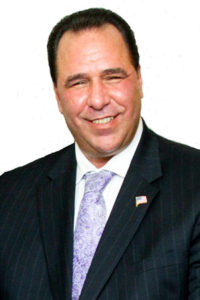COVID-19 has impacted our world unlike any health crisis during our lifetime. As this ravaging disease continues to spike in many regions, there are of course negative impacts on many other systems throughout society-including how we as individuals cope with the added stressors around us. The crash of our economy, many families facing life without basic resources or teetering on losing their jobs and homes, our educational system forced into tele-sessions, billions spent of saving our economy-the devastation is real. What one might not readily identify or think about is the behavioral health impact on our society.

Robert Anderson, LCSW-R,
CASAC, CARC, CRPA
Anxiety, depression, isolation, feelings of hopelessness, all have escalated to where people with strong coping skills and no mental health history are also finding themselves “stressed out”. What we must not forget is that overdoses and the use of alcohol and illicit substances are also on the rise during this time. The country was still in the grips of an Opioid epidemic when the Coronavirus pandemic hit. We must not shift our attention to only the latest crisis, and forget that rising overdose rates and families are still being destroyed by addiction- as the use of drugs and alcohol will only continue to rise during this time of increased social isolation and a healthcare system strained to the point that unless you are hospital admission ready, you are likely not even eligible to be tested for COVID-19. I personally see addiction screening, referral and treatment flying below the radar of the necessary attention it deserves during the continued opioid epidemic- not by fault, just the overwhelming media coverage and general attention the Coronavirus pandemic commands. Really, how can you not be overwhelmed by the greatest health threat in generations, if not ever?
So thankfully we have systems in place for people facing the grips of addiction that need detoxification, outpatient, inpatient, longer term residential care, and recovery-based supports and coaching. While our primary healthcare brethren are fighting COVID-19 and other diseases on the frontline with less than ideal resources; they rightfully receive the praise and admiration of the world- they are heroes! While taking nothing away from them, all I would ask is: let us not forget the frontline essential workers attending to the residential addiction and co-occurring mental health disorder needs of people in our substance use disorder systems. These people continue along unheralded, dedicated, also facing infection head on, and are truly heroes themselves.
It is not as simple as prescribing the latest medication assisted treatment product. As noted in a past article in the Rosenthal Report (started by Phoenix House founder Dr. Mitch Rosenthal), Dr. Sally Slater reminded us: “What we need to know is this: Addicted individuals have the capacity to make choices.
The most effective treatment programs for addiction rely not on medications alone, but on sanctions and incentives to shape more healthy behaviors. Engagement in treatment is key to recovery, because the longer a patient remains, the better he or she fares.” Using that logic, funding and maintaining inpatient levels of care and all modalities that combine into a full seamless continuum, are absolutely necessary to effectively battle the other epidemic we are still in the midst of: Opioid addiction.
Yet who will staff these high intensity, behavioral health specialty settings that require not only primary medical care teams, but kitchen staff, maintenance and janitorial workers, residential aides, let alone the obviously needed trained clinical professionals, in a time where there is already a workforce shortage of counselors, social workers and mental health professionals adequately trained in addiction? We then ask them to battle Coronavirus as well, but with one difference- these settings, while performing healthcare (integrated behavioral and primary in many cases) does not receive the same designation, resources, emergency funding or quite frankly the same respect as our hospital-based colleagues. This article is not meant to blame or admonish our primary system, again, they are absolutely doing amazing and selfless things during this crisis. All I ask is that the term “Hero” should not be reserved for only part of the healthcare system. Let’s recognize our residential SUD healthcare workforce, and advocate for the necessary resources, PPEs and other tools they need to make sure we eliminate BOTH epidemics (COVID-19 and the Opioid Crisis), that are simultaneously costing us the lives of our loved ones.
Robert Anderson, LCSW-R, CASAC, CARC, CRPA, currently serves as the Executive Director for the Educational Alliance and its Center for Recovery and Wellness, located in New York City, which provides integrated Substance Use Disorder, Mental Health and recovery-oriented services all in a dynamic new open and inclusive community center approach.




